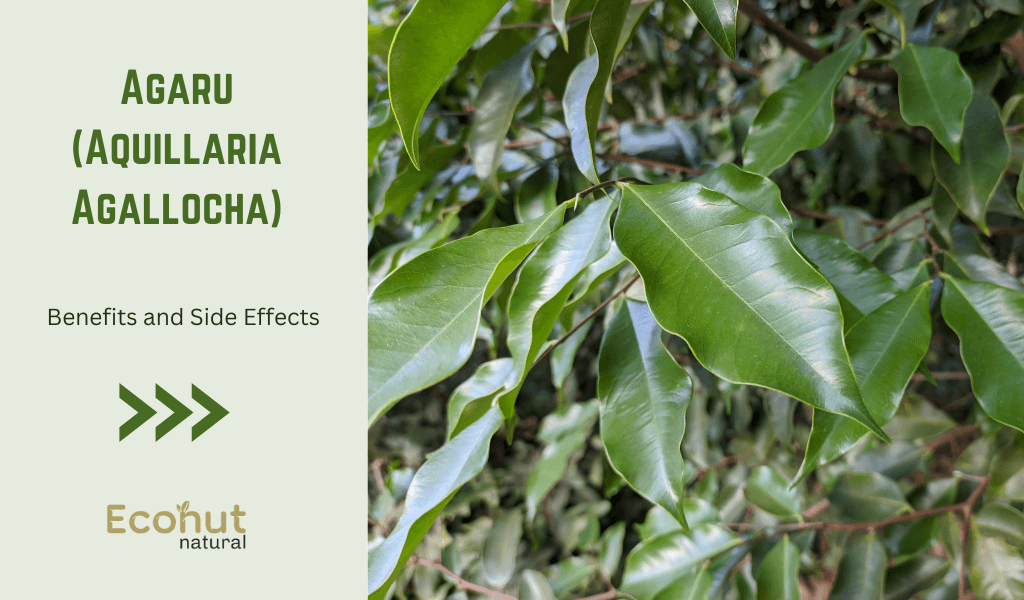Agaru (Aquillaria Agallocha) is a species of tree native to Southeast Asia, particularly found in countries like India, Bangladesh, and Myanmar. It belongs to the Thymelaeaceae family.
The process of agarwood formation is fascinating. When the Agaru tree is wounded, it produces a resin as a defense mechanism, which gradually darkens and becomes fragrant. This resin-infused wood is then harvested and used for various purposes, particularly in perfumery, where it adds a distinctive and luxurious scent.
Description
Aquilaria agallocha, commonly known as Agarwood or Agaru, is a species of tree native to Southeast Asia, particularly found in countries such as Bangladesh, India, and Myanmar. Here’s a description of Aquilaria agallocha:
Appearance:
Agarwood trees are typically medium-sized, reaching heights of up to 20 meters. The bark of mature trees is dark and deeply furrowed.
The leaves are alternate, lanceolate, and leathery, with prominent veins.
Habitat:
Aquilaria agallocha is primarily found in tropical forests, particularly in lowland and swampy areas.
Fragrance Formation:
Agarwood formation occurs in response to a specific type of fungal infection. When the wood is wounded by either a natural injury or human intervention, the tree produces a resinous substance as a defense mechanism. This resin gradually darkens and develops a rich, complex fragrance that is highly prized.
Importance:
Agarwood is famous for its aromatic properties and has been used for centuries in perfumery, incense, and traditional medicine The resinous wood is considered sacred in various cultures and is often used in religious ceremonies and rituals. Due to its rarity and high demand, agarwood is one of the most expensive natural raw materials in the world.
Scientific Classification of Agaru (Aquillaria Agallocha)
| Latin name | Aquilaria agallocha |
| Order | Malvales |
| Family | Thymelaeaceae |
| Genus | Aquilaria |
Names of Agaru (Aquillaria Agallocha)
Sanskrit : Aguru, loh, Krimij, Krimijagdh, Krumija, Krimijagdha, Anaryaka, Vishvaroopakam, Pravara, Jongakam, ShreshtaVriksha, Vamshika
Hindi/Urdu: Agar
English: Eagle wood
Arabic & English: Agarwood, Oud, Oodh
Japan: Jinko
Chinese: Chenxiang
Cambodia: Chann Crassna
Indonesia / Malay: Gaharu
Laos: Mai Kritsana
Thailand: Mai Kritsana
Myanmar: Thit Mhwae
Bengali: Agar Chandan, Agarkashtha, Agaru
Tamil: Agalichandanam, Aggalichandanam
Kannada: Krishna Agaru
Punjabi: Ooda, Pharsi
Telgu: Agaru
Europe: Agilawood, Eaglewood
Benefits of Agaru (Aquillaria Agallocha)
Agaru, also known as Aquilaria agallocha or agarwood, has been valued for centuries for its various benefits. Here, we explain some of benefits regarding Agaru (Aquillaria Agallocha).
Aromatherapy:
Agaru is highly prized for its distinctive and captivating aroma. It is commonly used in aromatherapy to induce relaxation, alleviate stress, and promote a sense of well-being. The rich, woody scent of Agaru is believed to have calming properties that can help reduce anxiety and improve mood.
Spiritual and Meditation Practices:
Agaru has a long history of use in religious and spiritual ceremonies. Many cultures believe that the fragrance of Agaru has the power to purify the mind, enhance focus during meditation, and facilitate spiritual experiences. Burning Agaru incense is a common practice in various spiritual traditions to create a sacred atmosphere and invoke a sense of reverence.
Traditional Medicine:
In traditional medicine systems such as Ayurveda, Traditional Chinese Medicine (TCM), and Unani, Agaru is believed to possess various medicinal properties. It is often used to treat respiratory conditions such as asthma, bronchitis, and coughs. Agaru is also believed to have antibacterial, anti-inflammatory, and analgesic properties, making it useful for alleviating various ailments.
Perfumery:
Agaru is highly sought after in the perfume industry for its unique fragrance. It is often used as a base note in perfumes to add depth, complexity, and longevity to fragrance compositions. Agaru oil, extracted from the resinous wood, is a prized ingredient in luxury perfumes and fragrances.
Incense and Rituals:
Agaru resin is commonly used to produce high-quality incense sticks and cones. Burning Agaru incense is believed to purify the air, ward off negative energies, and create a sacred ambiance during rituals and ceremonies. It is also used in religious offerings and rituals across various cultures.
Anti-inflammatory and Analgesic Properties:
Agaru has been studied for its potential anti-inflammatory and analgesic effects. Some research suggests that compounds found in Agaru may help reduce inflammation and pain, making it a potential candidate for the development of new therapeutic agents.
Antioxidant Activity:
It contains various bioactive compounds with antioxidant properties. Antioxidants help neutralize harmful free radicals in the body, thereby protecting cells from oxidative stress and reducing the risk of chronic diseases.
Cultural Significance:
Agaru holds significant cultural and historical importance in many regions where it is native. It has been used for centuries in religious rituals, traditional medicine, and cultural ceremonies, contributing to its enduring value and significance.
Properties of Agaru (Aquillaria Agallocha)
Hindi / Sanskrit
- Rasa, Katu, Tikta
- Guna, Laghu, Tikshna
- Virya, Ushna
- Vipaka, Katu
English
- Taste, Pungent, Bitter
- Physical Property, Light, Piercing
- Potency, Hot
- Metabolic Property, Pungent
(After Digestion)
Also More: Patala (Stereospermum suaveolens): Uses, Health Benefits and Side Effects
Agaru (Aquillaria Agallocha) Side Effects
The tree is highly valued for its aromatic resin, which is commonly used in perfumes, incense, and traditional medicine. While Agaru resin has several potential benefits, it’s important to note that, like many natural remedies, it can also have side effects, especially when consumed in excessive amounts or in certain forms. Here, We discuss some of side effects regarding Agaru (Aquillaria Agallocha).
Respiratory Issues:
Inhaling the smoke or fumes from burning Agaru incense may irritate the respiratory tract, leading to coughing, wheezing, or difficulty breathing, especially in individuals with preexisting respiratory conditions like asthma or chronic obstructive pulmonary disease (COPD).
Allergic Reactions:
Some people may be allergic to Agaru resin or its components. Allergic reactions can vary in severity and may include symptoms such as skin rash, itching, swelling, or difficulty breathing. Individuals with a known allergy to fragrances or botanical substances should exercise caution when using Agaru products.
Skin Irritation:
Direct contact with Agaru resin or its oil may cause skin irritation or allergic dermatitis in sensitive individuals. It’s advisable to perform a patch test before using Agaru essential oil or other topical products to check for any adverse skin reactions.
Digestive Disturbances:
Ingesting Agaru resin or its extracts may cause gastrointestinal upset in some people, leading to symptoms such as nausea, vomiting, diarrhea, or abdominal pain. This is more likely to occur when Agaru is consumed in large quantities or by individuals with sensitive stomachs.
Drug Interactions:
Agaru resin may interact with certain medications or other herbal supplements, potentially affecting their absorption, metabolism, or efficacy. Individuals taking prescription medications should consult with a healthcare professional before using Agaru products to avoid any potential interactions.
Avoid During Pregnancy and Breastfeeding:
There is limited information available regarding the safety of Agaru during pregnancy and breastfeeding. As a precautionary measure, pregnant or nursing women are advised to avoid Agaru products unless specifically recommended by a healthcare provider.
High Dosage May Toxic:
In rare cases, excessive consumption or inhalation of Agaru resin may lead to toxicity symptoms, including dizziness, headache, confusion, or convulsions. Seek medical attention immediately if you experience any severe or persistent adverse reactions after using Agaru products.
Conclusion
Agaru, derived from the resinous heartwood of Aquilaria agallocha, encapsulates a rich tapestry of cultural and spiritual significance. Revered for millennia, its essence has woven itself into the fabric of rituals and traditions across diverse civilizations. With its captivating aroma, Agaru transcends mere fragrance, evoking memories of ancient rites and ceremonial practices. Its journey from tree to treasured resin reflects a timeless connection between humanity and the natural world, where each drop holds the essence of centuries past. In the sanctity of temples and the tranquility of homes, Agaru continues to cast its spell, a testament to the enduring allure of nature’s bounty and the enduring legacy of fragrant treasures.
FAQS
What are the health benefits of Agarwood?
While scientific research on the health benefits of Agarwood is limited, it has been traditionally believed to have various therapeutic properties. These include its use as an analgesic, anti-inflammatory, aphrodisiac, and for promoting relaxation and stress relief.
How is Agarwood used for health purposes?
Agarwood can be used in various forms for health purposes, including as essential oil, incense, tea, and in traditional medicines. It is commonly used in aromatherapy for its calming and mood-enhancing effects.
Are there any side effects of using Agarwood?
While Agarwood is generally considered safe for most people when used in appropriate amounts, excessive consumption or prolonged exposure to its smoke or fragrance may cause allergic reactions or respiratory irritation in sensitive individuals. As with any natural remedy, it’s essential to use Agarwood responsibly and discontinue use if any adverse reactions occur.

